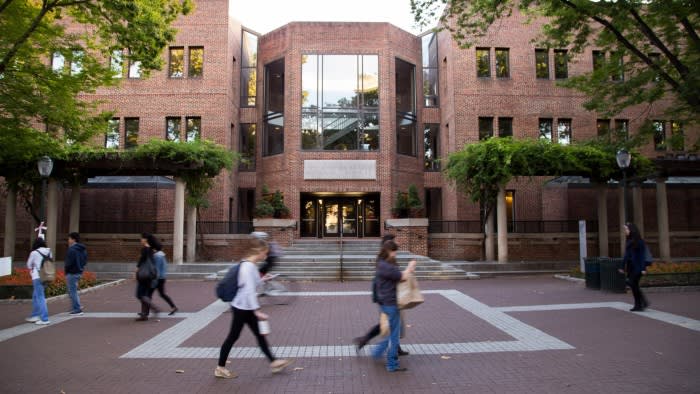Unlock the Editor’s Digest for free
Roula Khalaf, Editor of the FT, selects her favourite stories in this weekly newsletter.
Wharton has regained its position as the world’s leading provider of MBAs in 2024, according to the latest FT ranking of the top 100 global business schools.
The US school, based at the University of Pennsylvania, topped the assessment, which takes into account measures including value for money, alumni study aims achieved, gender and international diversity, the quality of academic research and school environmental policies, as well as salary and increases in pay. Schools’ participation is voluntary.
Wharton was followed by Insead in France, in second place, then Columbia in New York, SDA Bocconi in Milan and Iese in Barcelona.
MBA alumni are finding times tougher after graduation. In line with recent job cutbacks, including in banking and technology at a time of broader uncertainty in the global economy, graduate employment within three months of MBA completion across the ranked schools dipped to an average of 89 per cent, compared with 93 per cent the previous year.
The ranking also follows a year in which demand for business degrees has stagnated. The latest survey by the Graduate Management Admission Council in 2023 shows a drop of 5 per cent in applications for MBAs and a shift away from the full-time, in-person course and towards more flexible, part-time and online alternatives.
Global MBA Ranking 2024
Read the ranking and report, plus how we compiled our league table. Spotlight on the MBA webinar, February 21: businesseducation.live.ft.com.
The Wharton School, led by Dean Erika James, is ranked top in the research category, measured by recent faculty publications in leading academic and practitioner journals, followed by the University of Chicago: Booth, Harvard Business School and Columbia Business School.
Wharton’s alumni reported the third-highest average weighted salaries at $245,772, adjusted for those working in different sectors and for international purchasing power parity, three years after completing their courses. Stanford alumni had the highest weighted income, at $250,650, with Harvard graduates just behind at $246,509, while those from Columbia averaged $232,760.
Just four of the top 20 business schools ranked by highest weighted alumni salaries were from outside the US, led by Insead, south of Paris. The others were Milan’s SDA Bocconi, Shanghai University of Finance and Economics and the Indian Institute of Management Ahmedabad.

Stanford, in California, was ranked top for alumni assessments of aims achieved on their MBA, followed by Dartmouth College: Tuck in New Hampshire and the University of Virginia: Darden.
The University of Georgia: Terry is top for “value for money”, calculated by dividing the average alumni salary three years after completion by the MBA’s total cost, including tuition, forgone salary, opportunity cost and other expenses.
Four US schools were rated highest by former students for the quality of their alumni networks: Stanford first, followed by Dartmouth, Cornell in New York state and the University of Notre Dame: Mendoza in Indiana.
Georgia Institute of Technology: Scheller was judged top by former students for its career services, followed by UCLA Anderson School of Management, Shanghai’s Fudan University School of Management and then Peking University: Guanghua.
The highest salary increases — from when alumni began their MBA to three years after completing it — were reported at the Indian School of Business and two Chinese business schools: Fudan, followed by Shanghai University of Finance and Economics: College of Business.
The Indian Institute of Management in Ahmedabad is top for career progress — measured as an increase in responsibility in alumni’s role in employment and size of organisation — followed by Stanford and then Fudan.
SDA Bocconi School of Management is placed top for a public audit of carbon emissions in its operations and net zero emissions targets, followed by the University of Virginia: Darden, IE Business School in Madrid, Duke University: Fuqua in North Carolina, Esade Business School in Barcelona, and Rotterdam School of Management, Erasmus University.
MBA classes remain predominantly male, with an average of 41 per cent women across the 100 schools. Only Wharton, France’s ESCP and Audencia reported top-scoring parity between male and female MBA students, while 10 schools had more women than men.
The greatest diversity of employment by sector among students before starting their MBAs was at ESCP Business School in France, followed by Esade, Warwick Business School in the UK and then Brigham Young University: Marriott in Utah.
The Indian Institute of Management Calcutta is ranked top for the extent to which the most recent completing class carried out exchanges and internships of at least a month abroad, followed by HEC Paris, ESCP and then the Lisbon MBA Católica | Nova.
For insights into the ranking and business study, sign up for Spotlight on the MBA, a free online event on Wednesday February 21. The webinar is presented in partnership with leading business schools and will feature academics, admissions experts and FT journalists. businesseducation.live.ft.com

Robert Johnson is a UK-based business writer specializing in finance and entrepreneurship. With an eye for market trends and a keen interest in the corporate world, he offers readers valuable insights into business developments.








